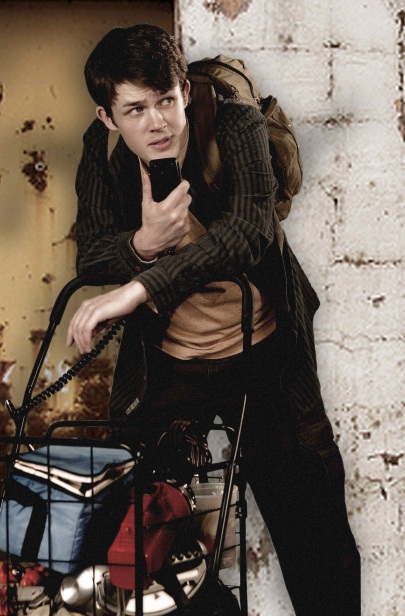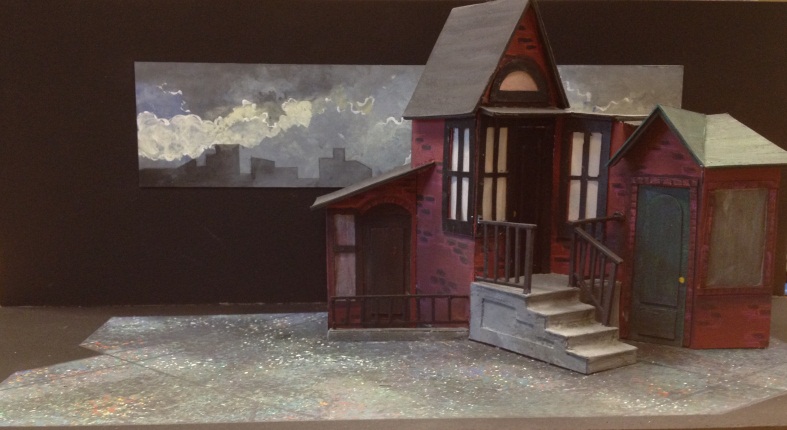Written by Catherine Hinrichsen, Project Manager, Seattle University Project on Family Homelessness, [email protected]

Nine-year-old Jacques saw a play with his mom the other night. He thought it was funny and had some good action. He liked the snacks in the lobby before the show. Then he got home and started thinking about it. And it changed the way he looks at his world. “He just never thought that a kid could be without a home,” his mom, Jennifer, said.
That’s the reaction of audiences around the world when they see “Danny, King of the Basement.” “Danny,” directed by Rita Giomi, is now playing at Seattle Children’s Theatre.
Danny’s story mirrors the experience of many children of homeless families, and creates an unprecedented opportunity to engage audiences around this issue.
Danny’s Story
Danny is a boy who looks like any other kid. Well, ok, he wears “pathetic” boots that are way too big. He never wears a coat, even though it’s a cold winter. He keeps a bunch of stuff in a rolling cart. And he always seems hungry. There’s a good reason: Danny and his mom are one step away from having no place to sleep.
“I can pack my bags faster than it takes to tie a shoelace,” Danny assures his mom. Later that day, he tells his new neighbor, Angelo, “I can make a friend in an hour and a best friend in a day.” It’s not boasting. It’s just something he’s learned to do, because he has to.
If you work to end family homelessness and you encounter people who don’t get it – don’t think it’s a problem, or show no sympathy, or think they could never be homeless – tell them to see this play, and maybe you’ll find a more receptive audience next time you talk to them.
“Danny” excels as a stimulus for discussion even among families who know the issue well. See the comments below from audience members at the Oct. 14 preview.
The wonderful SCT Artistic Director Linda Hartzell told the preview audience that seeing the play should be “the beginning of discussion. Later, in your car on the way home, or at dinner later this week, think of something that’s in your heart and talk about it.” Linda said that SCT believes that “good theater makes the world a better place to be.”
This extraordinary work by Canadian dramatist David S. Craig is an example of what happens when art responds to a social crisis. Craig, who co-founded Roseneath Theatre (Ontario’s largest touring theater), said he had been listening to the radio in 2001 and heard a shocking statistic: 25 percent of the homeless population in Toronto was children under age 12. As a parent, a Toronto citizen and a playwright, said Craig, he had to do something about it.

David S. Craig, author of “Danny, King of the Basement.” Photo courtesy of davidscraig.com.
“Danny” was the toast of Toronto when it debuted that year and won the prestigious Dora Mavor Moore Award for Best Production. It was performed for Parliament and has since won international acclaim. It’s now the most successful Canadian children’s play in Canada’s history, according to Craig’s Web site.
Bringing “Danny” to Seattle
Our involvement in this story began more than a year ago when our Project on Family Homelessness at Seattle University started to think creatively about how to increase public understanding of family homelessness. We had first recognized the power of art to reach audiences in unexpected ways, such as when we invited filmmaker Alexandra Pelosi to Seattle and Tacoma to screen her HBO documentary, “Homeless: The Motel Kids of Orange County,” for the members of SIFF.
What if we could collaborate with the Seattle Children’s Theatre, the beloved and respected theatre company that has introduced four million children to theatre since its founding in 1975? When we met with Linda Hartzell and then-Managing Director Tim Jennings, we learned that there already was a play that would be perfect: Danny. Tim had worked with David S. Craig at Roseneath Theatre, so he was well aware of the “Danny” phenomenon. SCT had wanted to produce the play for years, but with the economic downturn that hit the Seattle theatre community hard, a play like “Danny” posed somewhat of a risk.
Let’s face it, the story of a boy and his mom who are experiencing homelessness does not sound like a rollicking, feel-good box-office smash. But then again, anyone whose heart swelled with love, then broke, then lifted again reading “Charlotte’s Web” understands that some of the most revered children’s stories do not shy away from life’s challenges. Neither does the Children’s Theatre. Rather, their productions give children, teachers and parents/guardians a platform to talk about many issues of childhood: death, loss, cultural challenges, social awkwardness, true friendship, or the epic quest for courage, brains, heart and home (yes, “The Wizard of Oz,” opening Nov. 15).
A year later and through the contributions of funders, community members and the SCT teachers advisory committee, “Danny” takes a bow. Thousands of kids will see it either with their school or organization groups, or with their friends and families.

Community Forums in Everett and Tacoma
Before Danny opened, our project worked with SCT to create Community Forums on Family Homelessness in Pierce and Snohomish counties. Through the performance of selected scenes from the play, audience activities led by SCT’s magical Education Director, Karen Sharp, and stories contributed by community leaders, these forums helped stimulate dialogue about how kids like “Danny” fare in our local communities.
Not only did we learn about family homelessness; we saw firsthand that SCT truly understands how to connect with their audience, as Karen and the SCT staff took a set of statistics and facts about family homelessness in the counties and transformed them into meaningful and engaging activities.
At both forums, the scenes from “Danny” showed us five things about family homelessness in four minutes. Community leaders shared stories of real-life Dannys in our community, including a moving monologue written by Tammy Brown of United Way of Pierce County.
Community Preview in Seattle, Oct. 14
The third and final event of our series was the technical rehearsal/Community Preview in Seattle at the Children’s Theatre, Sunday, Oct. 14. About 150 people – including housing and homelessness providers, SCT subscribers and their children — were privileged to see a preview of the full show. Based on the reactions of audience members, it was a triumph on multiple levels.
Seven-year-old Hersh, whose father David Powers is the Dean of Seattle U’s College of Arts & Sciences, is a “total theatre kid,” according to his dad, the kind of kid who walks around the house singing tunes from “Wicked.” In fact, they had just come from a performance of “Wicked” at the Paramount Theatre and planned to stay only for the reception and then leave, because they already had “Danny” tickets for opening weekend. But Hersh wanted to stay once they got there, and loved it. Afterwards, he told his dad “Danny” was “his favorite play ever,” and he can’t wait to go back.
David Bley, director of the Pacific Northwest Initiative for the Bill & Melinda Gates Foundation, brought his son, Sam, age 12, who is familiar with his dad’s work. “Communicating through theater really brings home the reality and the emotions of the situation that he otherwise only gets when he goes on a site visit with me, or does community service himself,” David said afterwards. “This was more engaging, and more upfront and personal and immediate, and fun.”
Before the show, representatives of Seattle University, the Gates Foundation and Seattle Public Schools board member Kay Smith Blum spoke about their work to help end family homelessness in the region. The group also honored Bill Block, who is retiring from the Committee to End Homelessness in King County this month. Bill noted that 30 years ago, we didn’t see family homelessness. “This generation has grown up thinking homelessness is normal,” said the man who led King County’s efforts on its 10 Year Plan to End Homelessness. “It’s not.”
Right before we entered the theater, Linda Hartzell and Managing Director Mary Ann Ehlshlager told us what to watch for during the performance, including “an amazing reptile that’s a surprise.” Then it was time for the show.

Most all the action in the play takes place outside a tri-level home in an urban setting. Three different families call this dwelling home, and the windows give us a hint at their stories. Upstairs, we see windows with elegant, lacy treatments; this is the home of Penelope, a “snooty” girl accustomed to the finer things. She’s also “the meanest person in the universe,” according to Angelo, who lives in on the street level. Through Angelo’s window there often appears a fearsome silhouette of his father, accompanied by a (SPOILER ALERT) roar from a creature that may have been the “surprise reptile” Linda Hartzell had referred to earlier. And on the basement level, with a window that might be covered with a sheet, is the new home of Danny.
The home may only be temporary for Danny. But he’s used to short-term residences. “I’m the king of moving,” he tells his beleaguered mom, as a way of reassuring her. The two of them have moved eight times in two years.
How The Play Tells the Story of family Homelessness
The play really hits on so many issues surrounding family homelessness, said Mark Putnam of Building Changes after the show. In the very first scene, there’s an implication of domestic violence, a major cause of family homelessness, as Danny and his mom flee the home they’ve been sharing with not-exactly-Prince-Charming. In just over an hour, it also ties in job loss and job search, housing instability, school moves and academic instability, and meeting and making friends. Mark noted too the “Godzilla Dad,” the father who was brought low by his unemployment and finds it hard to parent in these high-pressure conditions.
Mark brought his daughter, Meri, age 8, and her friend. He said the girls loved the play’s physical comedy and were very curious how the fast-paced show – which took an abrupt turn into danger for Danny – could wrap up quickly in the time remaining and still “be happy.”
The comedy, which the kids seemed to love, definitely lightened up the serious theme. Audience member Theodora, age 10, daughter of Seattle U’s Barbara Dolby, said one of her favorite parts of the play was when Penelope heard the ring of one of her two cell phones (one for each of her divorced parents) and tried to figure out which one it was, “and she’s like ‘Hello?’ to one, and then ‘Hello?’ to the other.” Prof. Kevin Maifeld of Seattle U’s Arts Leadership program, who served as SCT’s interim managing director after Tim Jennings left and helped bring Danny to Seattle, said that this is one of many complicated sound cues in the play.
At one point we find out that when Danny’s mom rented the apartment, she hid the fact that she had a child. She was upset to hear that Danny had told Penelope, the landlady’s daughter, that he was living there. “Do you know how hard it is for people like us to find a place to live?” Danny’s mom exclaims. Maybe she meant people with little money for housing; but she could also have meant a mom and pre-teen son who are homeless. It’s a striking reminder that while 84 percent of homeless families are led by single mothers according to the National Center on Family Homelessness, mothers of adolescent boys often cannot find shelter for them together.
Danny not only exhibits external signs of poverty – the ill-fitting boots, the perennial hunger – but also the impact of homelessness on a child. He’s thrust into an adult role too soon, serving as the money manager of the family. He gamely rolls with the punches posed by the instability of their life, though he alternates between loving and petulant behavior toward his mom, and we don’t know if it’s because of typical pre-teen behavior, or brought on by his stressful situation. In a pivotal scene that leads to near tragedy, he is humiliated at his new middle school when he can no longer hide the fact that he can’t read.

Danny escapes his reality with a vivid imaginary life as a secret agent and his ability to create scenarios out of thin air, and he pulls the other kids right along with him. Some of the play’s most delightful moments occur when the kids are at play, improvising a hockey game with an invisible puck and impossible goal shots, or performing surgery with a pretend chainsaw. In these moments they forget their troubles. It’s a good thing, because it introduces some welcome moments of lightheartedness.
“Wow, that was — powerful,” my friend Jennifer Fisch said afterwards. “I had to use my cheese napkin.” She revealed the little scrunched blue square in which she’d wrapped some snacks from the pre-show reception for her nine-year-old son, Jacques. Apparently it had filled in as a makeshift tear-dabber during the play, which moves swiftly from laughs to sadness and back again. Jenn said she’d been wondering why Danny had been so disappointed when the new apartment had no TV, but it became apparent later why. “I was surprised that he couldn’t read,” she said, “but it made sense with all his school changes. And no wonder he was upset about the TV, because if he couldn’t read, there wasn’t that much for him to do.”
Jennifer, who is a stellar writer and editor for Seattle Children’s Hospital, said Jacques was snuggled up against her for the sad parts and excited during the action scenes. Jacques said he liked the play, and he thought the story Danny improvised when he couldn’t read aloud in class “WAS better,” but he had a question for me: “Can you tell the Children’s Theatre what plays to do? Because they should do one about two guys who do kung fu. Only they don’t really know how to do kung fu and they make it up.”
But later, the experience seemed to reach Jacques at a deeper level, and Jennifer said this really exemplifies the lasting impact the arts can have in how people understand life and issues. “That night before bed when we were saying what we are grateful for, Jacques said he was grateful for his parents, his dog and a safe warm home – and that the last piece was something he had never thought to mention before.”
Though art should not dictate what we feel, this play raises so many themes in just one hour that it demands we go home and think, as the wise Linda Hartzell advised us – about the meaning of home and what it’s like to go without one, the preservation of childhood, the struggles of growing up, what might be behind the cruelty of kids to one another, the need to protect your child and what happens when you can’t, and the collision between imagination and reality during tough times.
An hour after the curtain closed, one image stuck with me the most. It’s the soft, warm glow of the lights through the curtains in the little triplex at 92 Clinton Street. As the stage darkens to show the fall of night, the windows are luminous and beckoning. They signal that this is home. In a week when Seattle’s rainy season has finally returned and the cold-weather shelters reopened, it reminds us of the yearning for our own safe warm home that is common to all of us.
“Danny, King of the Basement” runs Oct. 18-Nov. 18 at Seattle Children’s Theatre. Tickets are available online or by phone at (206) 441-3322.
Have you seen “Danny” yet? If so, what did you think?